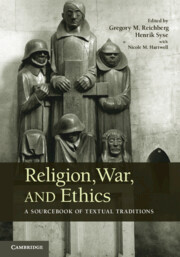Preface
The events of 11 September 2001 cast a harsh new light on links between religion and violence. While much of the attention was initially directed toward Islam, it was not long before parallels were explored within Christianity, Judaism, Hinduism, and other mainstream religious traditions. This coincided with a sharp rise of philosophical interest over the past decades in the ethics of war, particularly within the confines of what is standardly termed the Western “just war tradition.” Consequently, among scholars certainly, but also among the general public, there is now a wider recognition that religion has the dual potential to encourage and to restrain violence. While some religious adherents urge a complete renunciation of violence (pacifism), more often there can be found a mixed approach in which the resort to force is excluded under certain conditions but allowed and perhaps even enjoined in others. Some have looked for ethical alternatives to limit war; others have sought to justify acts of violence to make these acceptable in ethical terms; while still others have sought to use religious symbols and ideals to foment conflict in pursuit of political agendas.
Despite the accrued interest in religion, violence, war, and ethics, the source texts in which these issues are expounded have often remained inaccessible to all but a handful of specialists. This is especially true of traditions such as Islam, Hinduism, and Judaism, where the key authoritative treatments are often embedded in texts (e.g., Qur’anic jurisprudence, religious epics, or Halakhic commentary) that are not overtly about matters pertaining to the ethics of war, thus requiring a difficult process of interpretation and selection, and for which English translations frequently do not exist. Since debate in the public arena (on, for instance, what Islam does or does not teach regarding participation in violence) often hinges on a proper knowledge of the relevant textual traditions, the quality of such debate would be significantly enhanced if the most important texts could be made available, under a single cover, in English, to a broader reading public. It is with this goal in mind that the present book was conceived. A generous grant from the Research Council of Norway, for a four-year project on “Comparative Ethics of War,” enabled the idea to become a reality.


